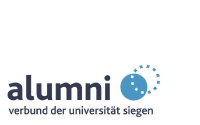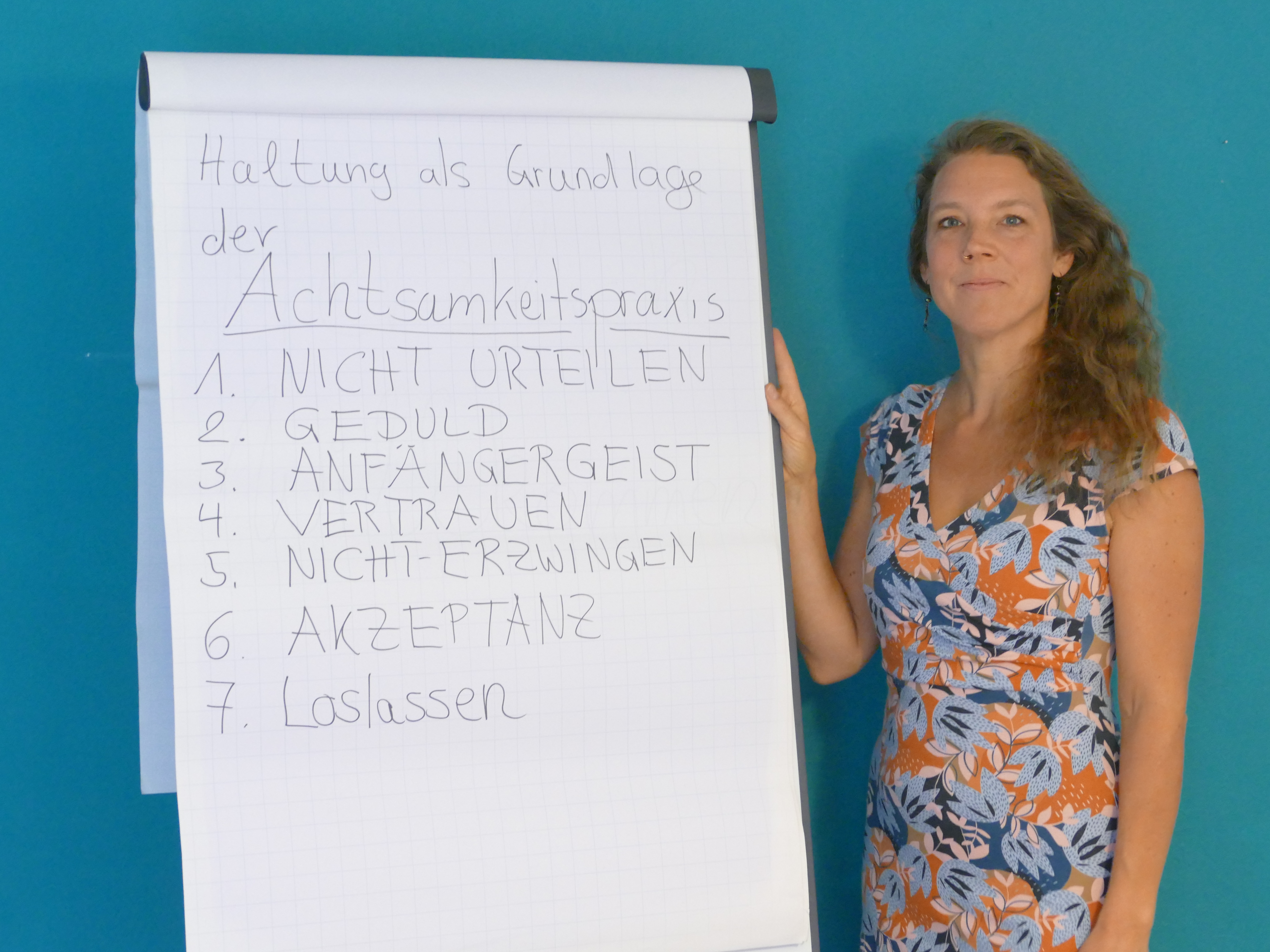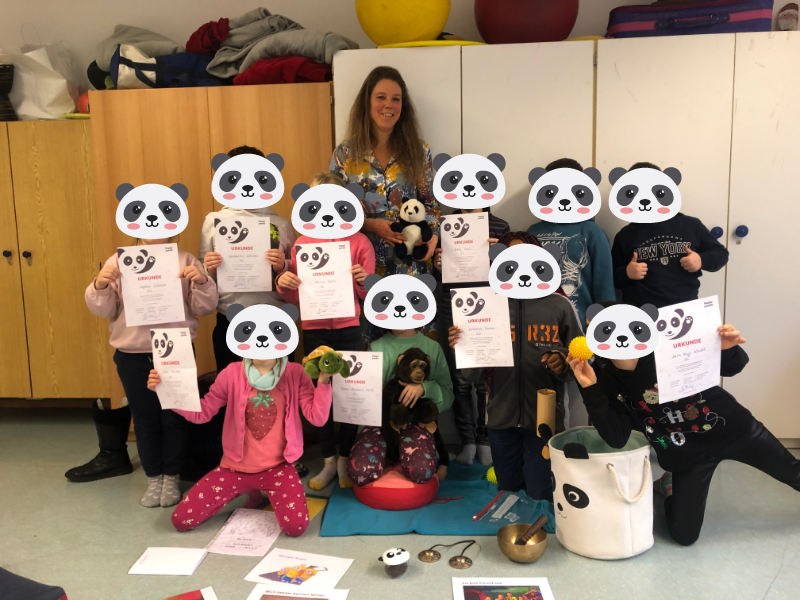Achtsamkeit57
Social worker Nicole Dreisbach fulfils a long-standing dream and turns her passion project into a career. As an MBSR (Mindfulness-Based Stress Reduction) and Happy Panda teacher, the native of Siegerland has been offering mindfulness courses for companies, organisations and people here in the Siegen-Wittgenstein region since March 2024.
What is Achtsamkeit57?
Achtsamkeit57 is a service company. I offer mindfulness training programmes for different target groups to help them cope with stress. The focus here is on the MBSR course, an eight-week programme, the only scientifically well-evaluated stress management programme, as well as the Happy Panda mindfulness training for children, where I offer training in primary schools and kindergartens. I also offer individual coaching sessions for people who are looking for a method to deal with stress and everyday problems. Practising mindfulness in the form of meditation, yoga and other methods helps us to deal with stress, anxiety and physical complaints. Negative thought and action patterns are recognised, broken and can be replaced by positive ones. The quality of life increases significantly and we gain long-term tools to deal with our problems and stresses.
What exactly does your job look like at the moment?
I am currently working as a Happy Panda trainer in several German Red Cross daycare centres, where I teach children mindfulness in a playful way. I am also currently giving an MBSR course and individual coaching sessions online and in person.
Why did you choose the name Achtsamkeit57?
I thought about what I could call my company and remembered a great children's festival in Siegen organised by 57Wasser. Just as the water involves my own region, I wanted my company to emphasise that I wanted to offer something for my home and this region.
Have you always wanted to be self-employed?
I kept toying with the idea of starting my own business, which I enjoy doing so much, but never had the courage to do so. When the desire grew and I was training to become a Happy Panda trainer and had so much fun giving my first course at my daughter's primary school, I had to do something. I thought to myself: I really just want to do this!
Do you believe that everyone has the ability to switch to self-employment?
No, I don't believe that. I know a lot of people who are employed and tell me that they can't imagine being self-employed because you have to deal with a lot of things. Self-employment involves dealing with marketing, advertising and accounting, for example. If you're not open and willing to tackle topics that are more uncomfortable or that you don't enjoy as much, then I don't think it's necessarily for everyone. Unless you have an incredible amount of money and can have the tasks done for you professionally.
What are the advantages and disadvantages of self-employment?
The advantages are the incredible freedom to work, to be able to realise and contribute your own ideas, to be very creative, to meet new people through networking and to be able to develop new concepts. The disadvantage is definitely all the legal and formalities, such as not having statutory health insurance, which you have to pay for yourself, as well as all the deductions and requirements you have from the legislator in terms of paperwork, data, etc. The Tax law is a difficult issue here in Germany, it's the most complicated in the world. That really is a disadvantage.
What advice would you give to young founders who want to set up their own business?
Networking and getting to know other women and men who are self-employed and going to events. There are parties, there are meeting places, lectures where self-employed people give their pitches; just go there and familiarise yourself with the topic. The city of Siegen also has a lot of initiatives to offer: The Gründerwerk, Startpunkt57, the university's Entrepreneurship Centre, the IHK. The next step is to make and do, i.e. take action and muster up a bit of courage.
Were there any offers of financial support, for example from the university?
Among other things, I received support from the employment agency via the employment and placement voucher (AVGs). I was able to take advantage of the first coaching programme there. Next, I applied to the university's Entrepreneurship Centre for the EXIST-Women programme, which has been supporting and guiding me since the beginning of the year. Through the Entrepreneurship Centre, I have my own coach, who I go to every fortnight for individual coaching sessions and who is available to me for all the issues I bring with me. She looks at my concept, how my business is structured, i.e. everything to do with setting up a business, forms of business, bookkeeping, surplus calculation, advertising and financing. As part of the programme, there are workshops and lectures, not only on topics relevant to self-employment, but also on personal development. So the programme is pretty wide-ranging. I was lucky enough to be selected for a scholarship, which meant that financial support was also secured for me via the university's EXIST Women programme.
As someone who has a very strong social streak and has worked in the social sector for two decades: What methods have helped you personally to get a grip on everyday stress?
Yoga, mindfulness and meditation. This has given me many years of support and taught me how to be and remain resilient in difficult phases of my life or during professional challenges. Mindfulness helps me to notice how I am feeling, to sense my limits and to recognise what my needs are. Another factor is not to compare yourself. Especially in this day and age of social media, people tend to compare themselves. Everything is presented there in a very great and colourful way. Not measuring myself against others and instead setting my own standards and priorities has helped me.
Are many people mindful today?
A lot of people are now hearing about mindfulness because it's totally en vogue in the public eye. However, it is often misunderstood. Mindfulness does not mean being gentle or careful with yourself or others. Mindfulness as an attitude means being present, curious in the concrete experience, without telling yourself good or bad stories and believing the thoughts in your head. There are some people for whom it is not advisable to practise mindfulness for health reasons. However, I clarify this with those interested in my courses or coaching sessions in a free preliminary discussion and this only affects a few people. Then again, there is a proportion of people who have no interest in the topic or have found other, sometimes destructive strategies to deal with stress and strain. However, the majority of our society would definitely benefit from practising mindfulness, especially in this day and age when we are all stressed and worried about the future.
What is your goal? What do you want to achieve with your company Achtsamkeit57?
One of my aims is to bring Happy Panda training to more primary schools. Both primary schools and nurseries benefit greatly from it. Mindfulness is already a compulsory subject in schools in England and they are achieving very good results. I would also like to address more educational staff, whether teachers, nursery school teachers or social workers, with my programmes, as everyday working life is becoming increasingly complex and the demands are growing. Anyone who cares for others needs good self-care! On the other hand, I would like to share the topic of mindfulness with young people at the beginning of their careers, whether they are students or trainees. The practice of mindfulness with its versatile methods helps to avoid falling into stress spirals and to develop good health management and self-care in order to deal with the increasing challenges of today's world.
This portrait is based on an interview with Nicole Dreisbach in September 2024 and was written by Duygu Cicek and Amalia Leela Schikora.
Click here for the start-up's homepage.




